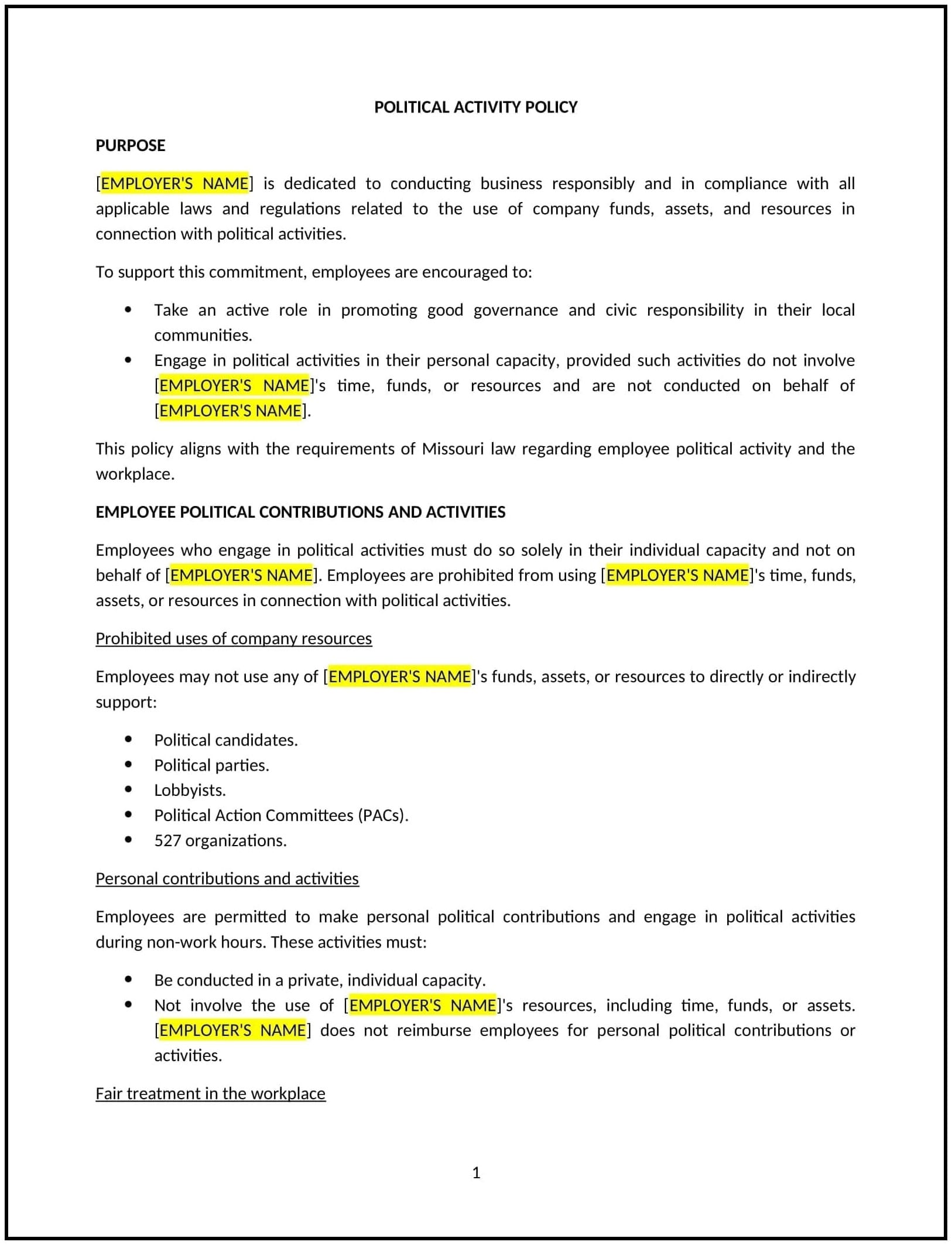Political activity policy (Missouri): Free template
Got contracts to review? While you're here for policies, let Cobrief make contract review effortless—start your free review now.

Customize this template for free
Political activity policy (Missouri)
A political activity policy helps businesses in Missouri establish clear guidelines regarding employees’ involvement in political activities, both in and outside of the workplace. This policy outlines the company’s stance on political contributions, campaigning, and advocacy, and specifies the boundaries between personal political activities and professional responsibilities. It is designed to ensure that employees can engage in political activities without compromising the company’s integrity or productivity, while maintaining a neutral stance in the workplace.
By adopting this policy, businesses can promote a respectful and inclusive environment, avoid conflicts of interest, and minimize any potential risks related to political involvement.
How to use this political activity policy (Missouri)
- Define political activity: Clearly specify what constitutes political activity, such as contributing to political campaigns, lobbying, public endorsements, or engaging in political protests. Clarify that political activity is not limited to elections but can include any advocacy that may have an impact on public policy.
- Establish workplace boundaries: Outline that political activity should not take place during work hours or in the workplace. Employees should be encouraged to keep their personal political activities separate from their professional responsibilities to avoid distractions or conflicts of interest.
- Set guidelines for political contributions: Specify whether employees are allowed to make political contributions using company resources, such as financial donations or time during business hours. Define any restrictions or reporting requirements related to political contributions.
- Address employee involvement outside of work: Acknowledge that employees have the right to engage in political activities on their own time, but set guidelines to prevent these activities from influencing their professional roles or impacting business operations.
- Prevent conflicts of interest: Set clear guidelines on how employees’ political involvement might impact their work, especially in cases where employees hold positions that may involve government relations, lobbying, or decision-making related to public policy.
- Promote a neutral workplace: Emphasize that the workplace should remain neutral and free from political pressure, ensuring that no employee feels coerced into participating in political activities or endorsing certain political views.
- Review regularly: Periodically review and update the policy to reflect changes in Missouri state law, federal regulations, and evolving business practices related to political involvement.
Benefits of using this political activity policy (Missouri)
This policy provides several benefits for businesses in Missouri:
- Promotes workplace neutrality: A clear political activity policy helps maintain a neutral work environment where employees can work without the influence of political agendas, ensuring that personal beliefs do not interfere with professional duties.
- Reduces conflicts of interest: By setting boundaries around political activities, businesses can minimize the potential for conflicts of interest or biases in decision-making, particularly when dealing with public policy or government relations.
- Supports employee rights: The policy allows employees to engage in political activities on their own time, while also ensuring that these activities do not negatively impact their work responsibilities or the business's operations.
- Protects business reputation: By maintaining a neutral stance on political matters, businesses can avoid any appearance of favoritism or partisanship, protecting the company's reputation in the community and the marketplace.
- Encourages respect for diversity: A clear policy helps create an environment where employees’ diverse political beliefs are respected, fostering inclusivity and preventing workplace tensions related to political differences.
- Mitigates legal risks: A structured policy helps businesses navigate the complexities of political activity, ensuring that they are compliant with any applicable Missouri state laws and federal regulations related to political contributions and advocacy.
Tips for using this political activity policy (Missouri)
- Communicate the policy clearly: Ensure all employees understand the guidelines around political activity, including what is acceptable and what is not, both during work hours and outside of work.
- Be consistent: Apply the policy consistently to all employees, ensuring that no one is given preferential treatment based on their political views or activities, and that the policy is enforced fairly.
- Separate political activities from work: Remind employees to keep political activities separate from their professional roles, including during meetings, in the workplace, or when interacting with clients and customers.
- Promote respect for all viewpoints: Encourage employees to engage in political discussions respectfully, fostering an environment where differing opinions are heard without causing division or tension.
- Monitor for conflicts of interest: Keep an eye on any situations where employees’ political involvement may create a conflict of interest, such as lobbying for policies that could directly affect the company’s operations or regulatory environment.
- Review regularly: Periodically review and update the policy to ensure it remains aligned with Missouri state laws, company goals, and the political climate, especially as new laws or regulations related to political activities are enacted.